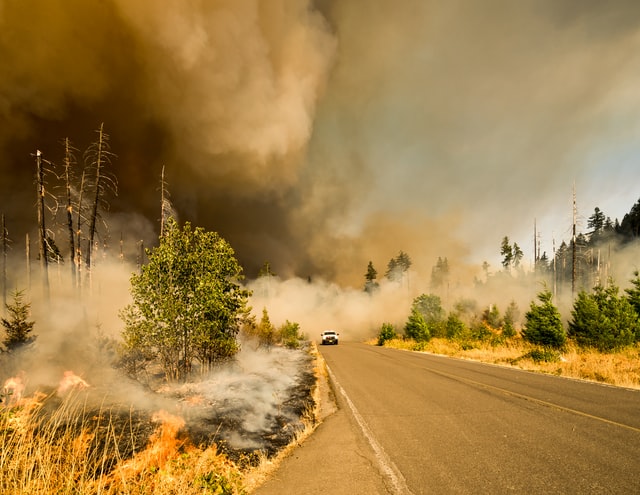The National Science Foundation (NSF) has awarded a $478,980 to University of Colorado and the Wildfire Research (WiRē) Center to collaborate on a grant that includes researchers from the University of Alaska Anchorage, Northern Arizona University, and the Tanana Chiefs Conference to work on the four-year project, Socio-ecological considerations for sustainAble Fuel treatments to Reduce wildfire Risk (SAFRR). The project team, led by University of Alaska researcher Dr. Jennifer Schmidt, will assess fuel treatments as a strategy to reduce wildfire risk in the boreal forest of Alaska and western Canada. The project is funded by NSF’s Navigating the New Artic program.
“This project will help us understand more about the effectiveness and social acceptance of fuel treatments like prescribed burns and thinning of vegetation in reducing wildfire risk,” Schmidt said. “Since the 1990s there’s been a dramatic increase in the amount of boreal forest burned each year in Alaska and western Canada. This area has experienced some of the most deadly and costly wildfire events in the last decade.”
Fuel treatments are among the main tools that land management agencies, landowners, and communities use to reduce risk to residents and infrastructure. However, effective fuel treatments require significant planning, implementation costs, and maintenance. They can also be controversial: they may face resistance and affect attitudes and behaviors of nearby residents.
SAFRR project team members will work with public land and wildfire practitioners; Indigenous organizations; and communities on the Kenai Peninsula, in Interior Alaska, and Anchorage, and Whitehorse, Yukon Territory, to co-produce an integrated assessment of fuel treatments that will include:
- preferred strategies, barriers to implementation, and key policies regarding fuel treatments
- insights into how vegetation responds to different treatments, installation and maintenance costs
- short-term and long-term ecological effects of fuel treatments and their influence on wildfire behavior
- how likely fuel treatments are to be acceptable to residents
- how alternative fuel treatment designs can achieve social, ecological, and public safety goals
Project team members
Dr. Jennifer Schmidt (Primary Investigator (PI) for UAA, overall)), assistant professor of natural resource management and policy at the Institute for Social and Economic Research, University of Alaska Anchorage
Dr. Hannah Brenkert-Smith (PI for CU), research associate professor at University of Colorado’s Institute of Behavioral Science. WiRē team member.
Dr. Patricia Champ (Collaborator), economist at the Human Dimensions Program at the U.S. Forest Service’s Rocky Mountain Research Station in Fort Collins. WiRē team member.
Chris Barth (Collaborator), fire mitigation specialist with the Bureau of Land Management. WiRē team member.
Dr. Michelle Mack (PI for NAU), regents’ professor of ecosystem ecology in the Center for Ecosystem Science and Society and the Department of Biological Sciences at Northern Arizona University.
Will Putman (PI for TCC), forester with the Tanana Chiefs Conference with extensive experience in forest management in Alaska and use of fuel treatments around rural Alaska communities.
Dr. Matthew Berman (Co-PI), professor of economics at the Institute for Social and Economic Research, University of Alaska Anchorage
Dr. Xanthe Walker (Co-PI), assistant research professor in the Center for Ecosystem Science and Society and the Department of Biological Sciences at Northern Arizona University.
Dr. Joseph Little (Co-PI), assistant professor of economics in the W.A. Franke College of Business at Northern Arizona University and an affiliate researcher with the International Arctic Research Center.
Alison York (Senior Personnel), Alaska Fire Science Consortium (AFSC) coordinator and is an expert in Alaska fire ecology, tundra fire, fire management, and science communication.
Chris Moore (Collaborator), fire analyst with the Bureau of Land Management.
About IBS
Researchers in the Environment and Society Program at the Institute of Behavioral Science (IBS) – University of Colorado Boulder study the relationship between social and natural systems around the world. Climate change vulnerability, resilience to earthquakes, hurricanes, droughts, and floods, and the management of natural resources are critical challenges that the world faces in the 21st century. The work of the program has a broad impact beyond academic circles, influencing policymakers and practitioners, as well as the general public. The program is highly interdisciplinary, bringing together expertise in anthropology, economics, geography, history, law, political science, and sociology.
About the Wildfire Research (WiRē) Center
The Wildfire Research (WiRē) Center is a nonprofit organization that works with wildfire practitioners to seek locally-tailored pathways to create fire adapted communities. The WiRē Center builds on the findings and the approach of the WiRē Team, a decade-plus partnership between wildfire practitioners and researchers focusing on new approaches to integrating local social science into wildfire education and mitigation programs.

